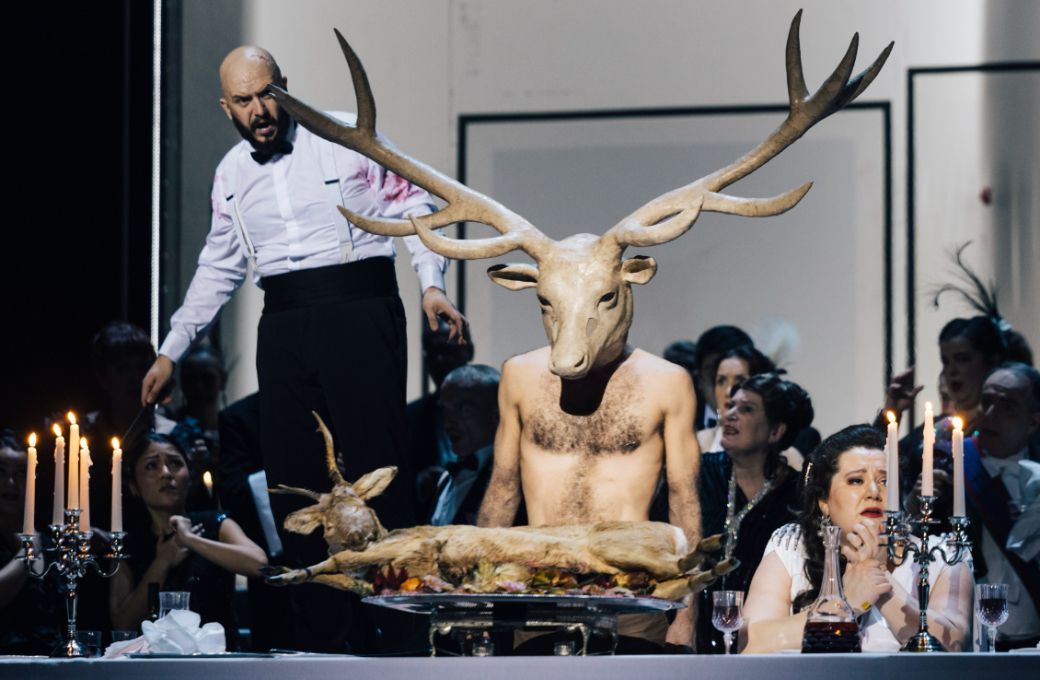What are some of the adjectives associated with both Verdi's and Shakespeare's Macbeth? Dark, scheming, ruthless, ambitious, haunted. And many more. Shakespeare and Verdi both make it a thrilling personal and political drama. But what does stage director Marie-Ève Signeyrole make of it at Deutsche Oper Berlin? An overloaded hodge-podge of messages that are far-fetched and do not contribute to an understanding of the story. It is a tribute to bad taste. Even in this day and age of no taboos on stage, there is a limit to how much explicit information the viewer needs to receive.
The evening begins with a pretty, ice-cold female avatar talking from a video wall about the optimisation of investment opportunities in companies operating in the North Atlantic that benefit from the power struggle between the oil industry and climate activists.

Signeyrole exaggerates Macbeth's primal fears about losing power and not having an heir. Heeding the prophecies of the witches, he has Banquo's son and his playmates poisoned at a children's birthday party – the stage is full of small corpses and balloons at the end of the scene. As far as Macbeth’s own acts of procreation go, he and his Lady most likely cannot even have old-fashioned and natural sex. Not even a naked man with antlers as a symbol of fertility running across the stage can help arouse either party. Instead, modern techniques are used – starting with explicit masturbation and ending with the detailed artificial insemination procedure on Lady Macbeth in a sterile and repulsive scene, including a video of the sperm swimming to the egg, making sure every single audience member gets the message. This procedure is indeed successful, but leads to an onstage stillbirth, graphically depicted with generous amounts of stage blood, which is the trigger for Lady Macbeth's Sleepwalking Scene.
The witches are depicted as uniformed cloned lobbyists, all of whom seek prophetic answers in the digital cloud on their tablets, presumably members of the same party as the female avatar. One could add many more such absurdities, but such a list does not contribute to the understanding, let alone enjoyment of the show. Fabien Teigné's sets, costumes by Yashi and video by Artis Dzerve emphasise the aesthetic sterility of Signeyrole's concept, piling far too many distracting symbols onto a story that is strong enough to stand on its own. Much less would have been much more.
Roman Burdenko's powerful baritone is well cast in the role of a fearful Macbeth. The veneer of his self-confidence is thin and his underlying fears repeatedly shine through unhindered. His Lady was Felicia Moore, stepping in to replace the scheduled Anastasia Bartoli. Moore was particularly convincing in the second half with her crystal-clear and effortless high notes. Possibly because of the last-minute stand-in, she embodied her role with a certain cool aloofness, which became the interpretation. Attilio Glaser sang Macduff with a beautiful lyric tenor, while Marko Mimica was fully convincing as Banquo with his dark bass. Rehearsed by Jeremy Bines, the chorus demonstrated its flexibility and differentiated sound.
Enrique Mazzola, a frequent and welcome guest in the pit, led the orchestra of the Deutsche Oper with a clear line and imbued this early Verdi with the necessary dose of italianita, emphasising the dramatic depths and emotional outbursts. On occasion, his reading often had the orchestra’s balance overpowering solo vocal and choral lines, obscuring the nuances of the singers’ interpretations.
The Berlin audience is not one to skimp with praise nor criticism: the few bravi for the directing team were overrun by a flood of boos. By contrast, there was unanimous applause for the singers and orchestra.


